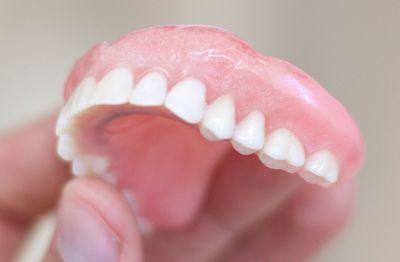
Much like comfortable, perfectly fitting shoes, well-made dentures can make all the difference.
At our dental clinic here in Martin, (near Gosnells, Kelmscott, Roleystone & Maddington), we understand the importance of your teeth and have the experience & know-how to create beautifully crafted dentures to ensure optimal comfort & confidence.
If you need to replace your missing teeth, the team at Mills Road Dental can help you choose the right options for your needs.
We have a variety of denture options to help improve your function and restore the fullness of your facial features. Plus, we offer emergency denture repairs.
Quality dentures | Great prices | Budget-friendly options
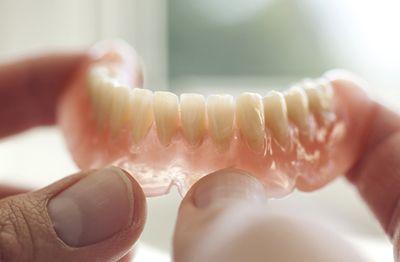
Full (removable) dentures
Full dentures, a.k.a. complete dentures, are recommended when you have all your teeth in your upper or lower jaw missing. Depending on your budget, we can offer a variety of options.
Your full, removable dentures will be carefully customised by our in-house dental prosthetist. Later, your dentures will need to be relined by our dentist every 6 to 12 months – to make sure they fit snugly in your mouth. And of course, if you have any breakages or need urgent repairs, we’ll always help you right away.
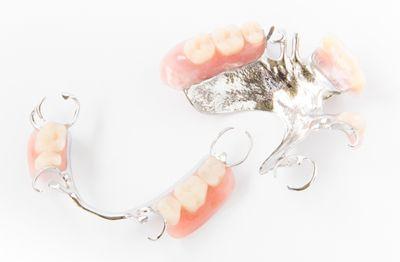
Partial dentures
Partial dentures are recommended if you have some teeth missing in either your upper or lower jaw. Partials sit in between your existing teeth to take the place of your missing teeth. They make talking and eating easier, and give you a more natural looking smile.
Partial dentures can be made of either acrylic or chrome. The most affordable option is an acrylic. Partial acrylic dentures can be relined or, if you require more teeth, these can be added. Acrylic dentures can also be used as an interim measure while you wait for your chrome dentures to be made.
Chrome dentures are stronger than acrylic, last longer, have less chance of breaking and generally speaking, are more comfortable for the wearer. Consequently, they are more expensive.
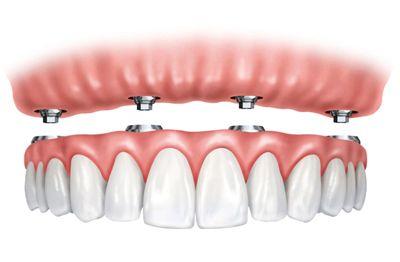
Implant supported over-dentures
Differing from conventional dentures which rely on suction to your upper or lower jaw to stay in place, implant supported dentures are secured to dental implants. These dental implants are placed in your jawbone below the gum line (several months before the implant supported overdenture is fitted), to secure the denture.
Implant supported dentures are by far the most secure option for denture wearers. They allow excellent bite retention (so you can bite and chew far more easily), almost as if you had natural teeth. They allow you to improve your nutritional intake and quality of life significantly. However, as they require dental implants, the price may be prohibitive for some.
If you’re interested in this procedure, talk to one of our team at Mills Road Dental today.
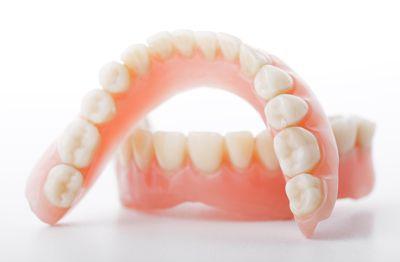
Immediate dentures
Not a long-term solution, immediate dentures are simply the dentures you are given ‘immediately’ after your dentist has removed your remaining teeth. The purpose is to act as a stand-in, giving you a temporary replacement, while your gums and jaw are healing for the next eight weeks.
After your healing time, your gums and jaw may change shape. If this happens, you’ll need to have your immediate dentures relined, so they continue to fit well in your mouth. When your gums and bone have finished healing, you’ll be given your new pair to wear. Many people hold onto their immediate dentures to use as a backup, in case your regular ones break or go missing.
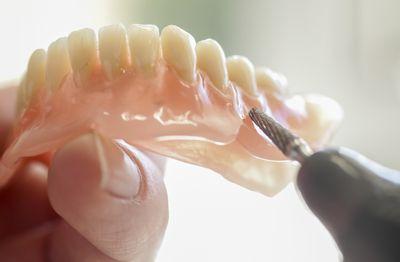
Denture repairs & relines
At Mills Road Dental, we have an on-site dental lab where our dental prosthetist can take care of all emergency denture repairs. If you’ve chipped or broken your denture, broken the class or simply have a denture that is uncomfortable to wear, give us a call and we’ll organise an appointment for you straight away.
All dentures require relining every 6 to 12 months. A denture reline is a simple procedure where your dentist will reshape the underside of your denture. Regular relines are necessary as over time, your gums and jawbone slowly change shape. Consequently, your dentures will need to be slightly modified or relined to maintain a snug fit.
Frequently Asked Questions
How much do dentures cost?
The cost of dentures vary, depending on what you need and want. For partial dentures, you can choose acrylic or chrome.Partial acrylic dentures start at $1234 for upper or lower jaw, while chrome partial dentures start at $2367. When a full denture is required, we use an acrylic denture. Generally speaking, full dentures start at $1234 per upper or lower denture.
Where will my dentures be made?
At Mills Road Dental Centre here in Martin (near Gosnells), we have an on-site laboratory where we can create your dentures. This has the advantage of saving time, see won’t have to wait as long for your new set of dentures and all repairs and adjustments can be done on the day.
Is it painful getting dentures?
When you first get your new dentures, there may be a little discomfort or minor irritation. However, this should fade as your mouth and gums become accustomed to them. If you’ve just had teeth extracted, the area of extraction may be quite tender for several weeks. As you go through the healing phase, you’ll need to regularly visit your dentist to adjust your dentures. Once you have healed and been fitted with your regular dentures, any pain should disappear. If you do experience any ongoing irritation or sores, though, come back and see us – as it’s likely that your denture may need adjusting.
Will my dentures be a different colour to my natural teeth?
Our expert team is highly trained in colour and shade matching and can create a denture that perfectly matches your remaining natural teeth. If you have an existing denture that looks different to your natural teeth, we will create a new denture instead of trying to change the shade, as the cost will be the same.
Adhesives don’t work for me. What can I do?
Often, your dentist will prescribe a denture adhesive to help keep your denture in place. However, if you’ve been without your natural teeth for a long time, your bone tissue may have resorbed or wasted away, which makes it more difficult for the denture to remain stable. In these instances, you may want to think about a potential bone graft and dental implants to secure your denture for a more secure and long-term option.
Can I eat everything with dentures?
If you’ve just been given dentures, it may take some time to adjust to them, which includes learning to eat. Initially, we recommend you adhere to a liquid diet, such as soups, yoghurt and jelly; then slowly introduce soft foods like scrambled eggs, stewed fruit, mashed potatoes, soft pasta, and thoroughly cooked vegetables. Eating foods like steak, raw vegetables and fruit may always be difficult for some, however.
Do you have dentures for just some missing teeth?
Yes, if you only have one or several teeth missing, we can fit you with a partial denture. This is a removable appliance that can help restore the function and appearance of your jaw and can more easily eat certain foods. Partial dentures are particularly good for those individuals that can’t afford dental implants but want something to help replace the look and feel of natural teeth.
What are full dentures?
Full dentures are a complete set of dentures, either upper or lower, made for individuals who have no remaining teeth in either the upper or lower jaw.
What are immediate dentures?
Immediate dentures are dentures that are given ‘immediately’ after tooth extraction. Sometimes, these dentures are known as ‘healing’ dentures because they help with healing. If you’ve just had your teeth extracted, the last thing you want to do is leave the clinic without a replacement. This is one reason why immediate dentures are given. They also have other benefits, such as applying pressure to the extraction area, which helps stop bleeding and also helps with healing, and it helps the patient get used to the feeling of wearing dentures in their mouth. When patients are fitted with their long-term dentures, they are encouraged to keep their immediate dentures as a backup, in case they lose or break their dentures.
When do I know that it’s time for a denture reline?
Over time, your gums and jaw change, so a denture that once fit perfectly will no longer feel as snug. So if you feel that your denture no longer fits as well as it used to, come in and see us. A reline involves refitting the base of your denture so that it fits more securely.
How do I clean my dentures?
You can clean your dentures with an old toothbrush. Using a cleanser and water, gently brush your denture, then rinse it thoroughly to keep it clean. Afterwards, let your denture dry on a small towel overnight. Remember – if ever you’re in a situation where brushing your dentures is not possible, try to regularly rinse your mouth and dentures with water to help keep bacteria in control.
Do I have to take my dentures out at night?
You should take your dentures out at night to give your gums and jaw a rest. Your saliva carries beneficial bacterial agents, and by removing your denture, your gums can be exposed to these agents, which help to avoid infection. However, if you’ve just been given immediate dentures, your dentist may suggest you wear these at night to help your mouth adapt.
How are dentures fixed to my mouth?
Conventional dentures aren’t fixed to implants, so they are not as secure. But they do stay in place if they have been well made and fitted properly. A thin layer of your saliva between the guns in the denture will help feel them in place. This is why if the denture has been well made, more of it will connect to the surface area, improving the seal. Over time, your gums and jaw will change slightly, so you’ll then require a denture reline to adjust the denture to once again fit more snugly against your gums. Lower dentures can feel a little less secure than upper dentures because of the shape of the gums on the lower ridge, and the movement of the denture caused by the tongue.
I’ve never liked my dentures. What can I do?
Some people never feel comfortable wearing dentures, while others adapt well and wear them happily for years. If you’re one of the former, you may want to think about dental implants. Dental implants, a.k.a. tooth implants are small, titanium screws that are inserted into the jawbone, below the gum line. They are attached, via an abutment, to either a single tooth (dental crown) or an implant-supported denture or a fixed bridge. These implant-supported options are far more stable than conventional dentures, and although they cost a little more, almost all people say the benefits are well worth the investment.
Talk to our dentist about dentures today!
Quality dentures | Great prices | Budget-friendly options
Mills Road Dental provide dentures to patients in Gosnells, Martin, Kenwick, Maddington, Orange Grove, Rolleystone, Kelmscott, Camillo, Champion Lakes, Huntingdale, Harrisdale, Southern River, Thornlie, Lesmurdie.
